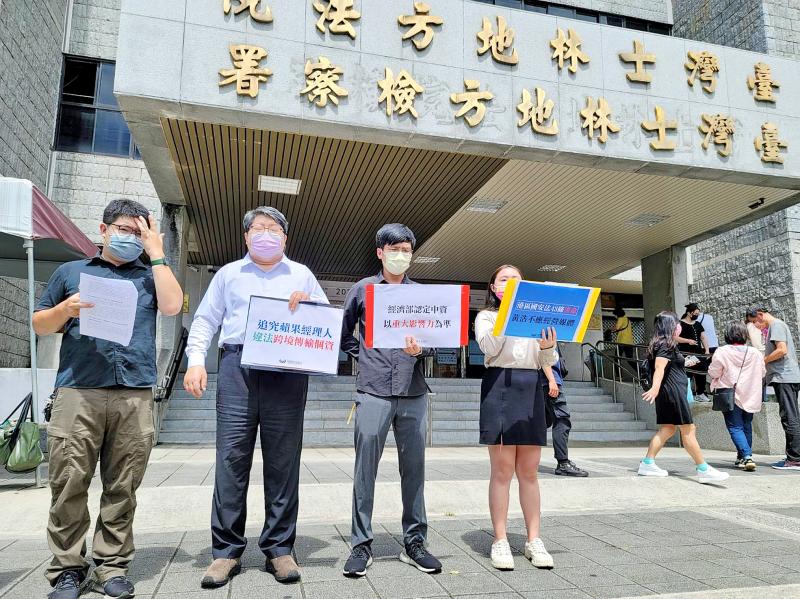The Economic Democracy Union think tank yesterday filed a judicial complaint against two executives of the Taiwanese edition of the Apple Daily news Web site, accusing them of breaching the Personal Data Protection Act (個人資料保護法).
Apple Online, the sister Web site of Hong Kong’s now defunct Apple Daily newspaper, said on Wednesday last week that it has been sold and the handover completed.
The change of ownership has prompted concern from critics, who said the government should ensure that Apple Online does not fall into the hands of foreign owners backed by Chinese capital.

Photo: Wen Yu-te, Taipei Times
Joseph Phua (潘杰賢), a Singaporean entrepreneur who co-founded 17LIVE, a giant Asian live-streaming platform, and Hong Kong businessman Kenny Wee (黃浩) are the company’s new owners, the Chinese-language Hong Kong daily Ming Pao said.
Union convener Lai Chung-chiang (賴中強) yesterday went to the Shilin District Prosecutors’ Office in Taipei and requested an investigation into suspected breaches of the Personal Data Protection Act by Apple Online CEO Wu Yu-ai (吳玉愛) and chief financial officer Johnny Chern (諶讚鑫).
Lai said the Ministry of Culture last year issued two injunctions regarding the company’s sale: one requiring it to refuse a court order and a request by Hong Kong authorities regarding financial matters and private information; and another prohibiting cross-border transfers of its database and personal information.
All supervisors and board members at the company quit last year, as well as most Taiwanese executives and managers, Lai said, adding that Wu is in charge of operations.
However, Wu told workers’ union representatives that she has no authority regarding the handling of the sale, Lai added.
Lai said that the people negotiating the deal are likely Hong Kong citizens Kenny Tam (譚競正) and Man King-shing (文景城), whom a Hong Kong court appointed to liquidate the Apple Daily and its news magazine holdings.
“The Taiwanese government does not accept the ruling by the Hong Kong court, and does not recognize the people who were appointed to handle the liquidation. Taiwan never approved entry by Tam and Man to carry out the liquidation and assess the company’s financial details, so how were they able to conduct and finalize the NT$1.5 billion [US$50.43 million] deal from outside Taiwan?” Lai asked.
The deal would naturally involve the transfer of the company’s records on employees’ personal information, monthly wage payments, list of debtors and business accounts, Lai said.
The most valuable is the company’s internal database on its news gathering and media work over the years, containing a large amount of personal information about reporters, interviewees, politicians, government officials, business leaders, writers and contributors, he added.
It is therefore very likely that someone in Taiwan has broken the law by allowing the transfer of this information, Lai said, adding that Wu and Chern are likely responsible, as they are in charge of operations.
The judiciary has been asked to investigate whether they had broken the Personal Data Protection Act, Lai said.

Taiwanese scientists have engineered plants that can capture about 50 percent more carbon dioxide and produce more than twice as many seeds as unmodified plants, a breakthrough they hope could one day help mitigate global warming and grow more food staples such as rice. If applied to major food crops, the new system could cut carbon emissions and raise yields “without additional equipment or labor costs,” Academia Sinica researcher and lead author the study Lu Kuan-jen (呂冠箴) said. Academia Sinica president James Liao (廖俊智) said that as humans emit 9.6 billion tonnes of carbon dioxide compared with the 220 billion tonnes absorbed

The Taipei Mass Rapid Transit (MRT) Wanda-Zhonghe Line is 81.7 percent complete, with public opening targeted for the end of 2027, New Taipei City Mayor Hou You-yi (侯友宜) said today. Surrounding roads are to be open to the public by the end of next year, Hou said during an inspection of construction progress. The 9.5km line, featuring nine underground stations and one depot, is expected to connect Chiang Kai-shek Memorial Hall Station to Chukuang Station in New Taipei City’s Jhonghe District (中和). All 18 tunnels for the line are complete, while the main structures of the stations and depot are mostly finished, he

Taipei is to implement widespread road closures around Taipei 101 on Friday to make way for large crowds during the Double Ten National Day celebration, the Taipei Department of Transportation said. A four-minute fireworks display is to be launched from the skyscraper, along with a performance by 500 drones flying in formation above the nearby Nanshan A21 site, starting at 10pm. Vehicle restrictions would occur in phases, they said. From 5pm to 9pm, inner lanes of Songshou Road between Taipei City Hall and Taipei 101 are to be closed, with only the outer lanes remaining open. Between 9pm and 9:40pm, the section is

China’s plan to deploy a new hypersonic ballistic missile at a Chinese People’s Liberation Army Rocket Force (PLARF) base near Taiwan likely targets US airbases and ships in the western Pacific, but it would also present new threats to Taiwan, defense experts said. The New York Times — citing a US Department of Defense report from last year on China’s military power — on Monday reported in an article titled “The missiles threatening Taiwan” that China has stockpiled 3,500 missiles, 1.5 times more than four years earlier. Although it is unclear how many of those missiles were targeting Taiwan, the newspaper reported